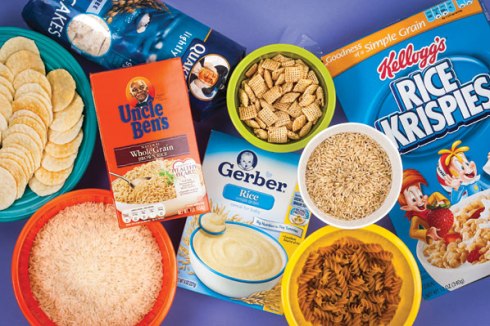Organic rice baby cereal, rice breakfast cereals, brown rice, white
rice—new tests by Consumer Reports have found that those and other types
of rice products on grocery shelves contain arsenic, many at worrisome
levels.
Arsenic not only is a potent human carcinogen but also can set up children for other health problems in later life.
Following our January investigation, “Arsenic in Your Juice,” which found arsenic in apple and grape juices, we recently tested more than 200 samples of a host of rice products. They included iconic labels and store brands, organic products and conventional ones; some were aimed at the booming gluten-free market.
Arsenic not only is a potent human carcinogen but also can set up children for other health problems in later life.
Following our January investigation, “Arsenic in Your Juice,” which found arsenic in apple and grape juices, we recently tested more than 200 samples of a host of rice products. They included iconic labels and store brands, organic products and conventional ones; some were aimed at the booming gluten-free market.
The results of our tests were even more troubling in some ways than
our findings for juice. In virtually every product tested, we found
measurable amounts of total arsenic in its two forms. We found
significant levels of inorganic arsenic, which is a carcinogen, in
almost every product category, along with organic arsenic, which is less
toxic but still of concern. Moreover, the foods we checked are popular
staples, eaten by adults and children alike. See the chart summarizing
results of our tests for arsenic in rice or rice products.
Though rice isn’t the only dietary source of arsenic—some vegetables, fruits, and even water can harbor it—the Environmental Protection Agency assumes there is actually no “safe” level of exposure to inorganic arsenic.
No federal limit exists for arsenic in most foods, but the standard for drinking water is 10 parts per billion (ppb). Keep in mind: That level is twice the 5 ppb that the EPA originally proposed and that New Jersey actually established. Using the 5-ppb standard in our study, we found that a single serving of some rices could give an average adult almost one and a half times the inorganic arsenic he or she would get from a whole day’s consumption of water, about 1 liter.
We also discovered that some infant rice cereals, which are often a baby’s first solid food, had levels of inorganic arsenic at least five times more than has been found in alternatives such as oatmeal. Given our findings, we suggest limiting the consumption of rice products.
Though rice isn’t the only dietary source of arsenic—some vegetables, fruits, and even water can harbor it—the Environmental Protection Agency assumes there is actually no “safe” level of exposure to inorganic arsenic.
No federal limit exists for arsenic in most foods, but the standard for drinking water is 10 parts per billion (ppb). Keep in mind: That level is twice the 5 ppb that the EPA originally proposed and that New Jersey actually established. Using the 5-ppb standard in our study, we found that a single serving of some rices could give an average adult almost one and a half times the inorganic arsenic he or she would get from a whole day’s consumption of water, about 1 liter.
We also discovered that some infant rice cereals, which are often a baby’s first solid food, had levels of inorganic arsenic at least five times more than has been found in alternatives such as oatmeal. Given our findings, we suggest limiting the consumption of rice products.
Source:Consumer Reports magazine: November 2012











0 comments :
Post a Comment